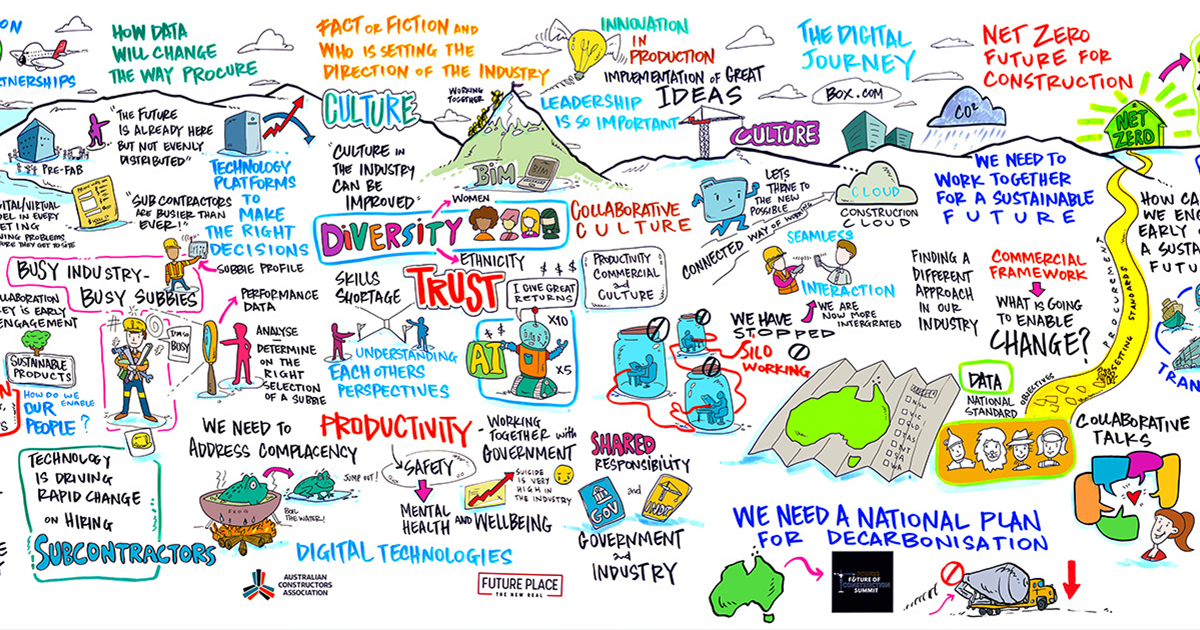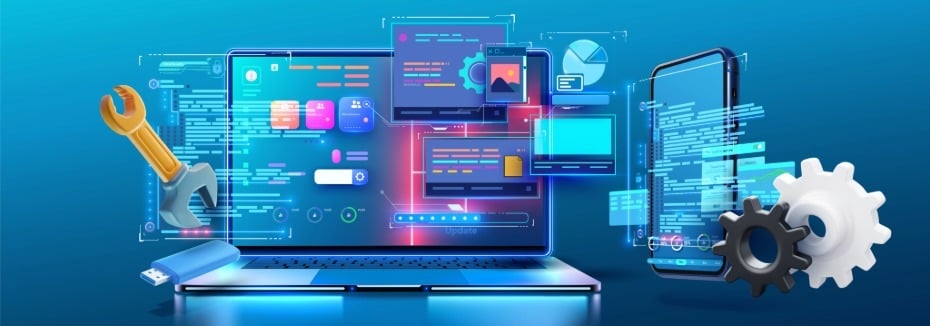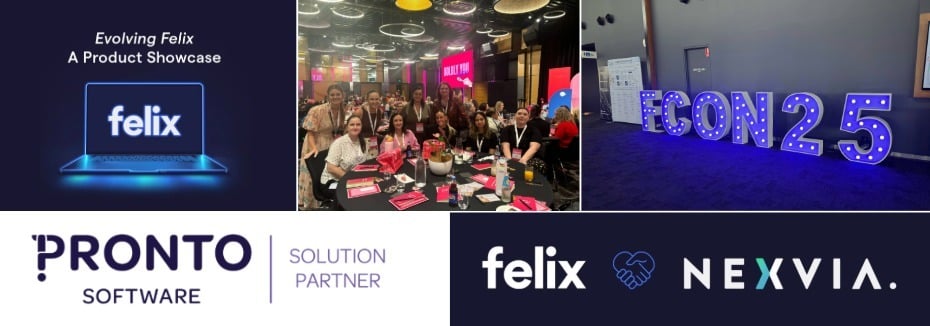The recent Future of Construction Summit held in Sydney was a convergence of many wonderful thoughts, ideas and discussions – all around improving the sector as a whole. Felix had the pleasure of being there as one of the event’s sponsors and learning so much from everyone.
Here are the key themes picked out from two technology-related panels at FCON22, and what the tech leaders had to say.
· Setting the direction and unleashing the transformation to digital in construction
· Examining the technology and trends driving change across modern construction
Overview of tech changes
“Things that have happened over the last 10 years, which has accelerated the adoption of technology and industries:
First of all, miniaturisation, the ability to actually put components into a very small thing.
The second piece is the cloud: the extensibility scalability of being able to get data anywhere and to be able to do that at low cost in a very secure way.
The third piece is standards, and the ability for us to look at the way in which different systems are interoperable.
The other thing I wanted to share with you is the convergence of operations technology with information technology.”
Catherine Caruana-McManus, Meshed IoT
Inefficiencies within internal processes
On highlighting inefficiencies:
“Everybody in this room is the cause of the problems we have in construction today.
You guys have got the ability to solve the inefficiencies through the project lifecycle. Even worse, most of us when we see those inefficiencies, we turn a blind eye to them. Those inefficiencies are baked into the way we work within our businesses.
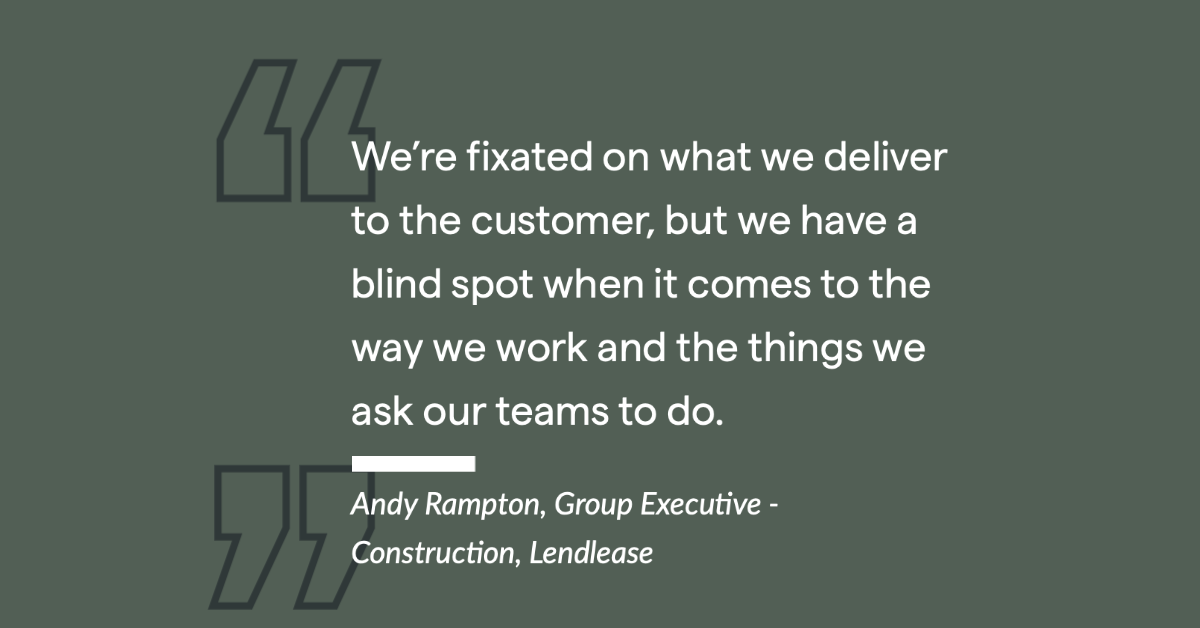
We set about creating the internal customer focus and said “look, we owe you guys working on the projects in the project teams as much of our time and attention as we do our external customers."
And when you say that customer focus back internally, you do start to see the opportunities to make their lives easier by reducing some of the bureaucracy that exists.”
Andy Rampton, Lendlease
And the role of tech in addressing those:
“It's using technology to improve our productivity on site, to change the participation and get more people into the business, but it's also using technology to improve our processes so that we have better efficiencies within the actual project lifecycle.”
Pia Hansen, Downer
Data, data and more data
On the importance of data:
“We call ourselves the construction industry which brings up lots of images of crane and concrete and steel, but I think for most of us, possibly even 95% in the room - we're information managers…We take information, we manipulate it and we pass it on.
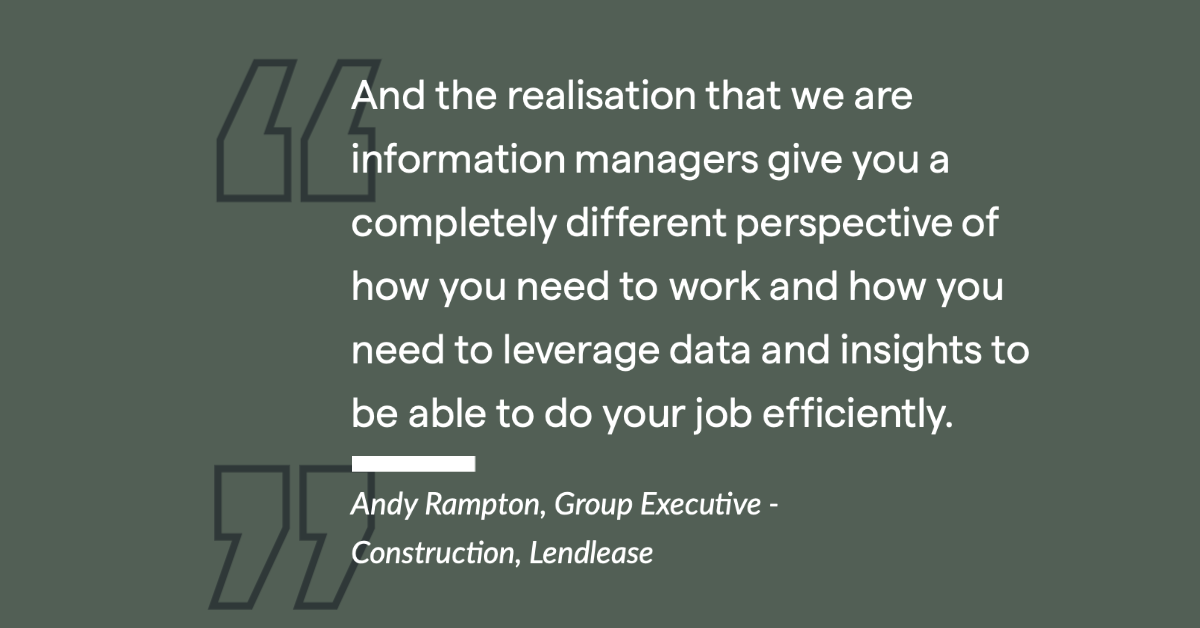
Andy Rampton, Lendlease
On the drivers of collecting and making use of data:
“Much like other construction organisations, we spend a lot of time correlating data, formatting data and we know we've got engineers that don't engineer, they move data around on Excel spreadsheets.
One of the things we wanted to do is give back our project managers their Sundays because the Monday is a project review, they spent the whole of Sunday trying to collate that data.
What I say though, is don't start on that journey unless you've got the full support of the executives, but also the people that are going to be consuming and preparing that data.
Because it doesn't matter how great a system is, if we're not actually using it or people aren't trusting the system, then it's not going to be used and it'll actually fall flat.”
Heinrich Kukkuk, McConnell Dowell
And how to get started:
“If you have a data strategy, it opens up the conversation. It then doesn't become difficult because you can think about maybe just three things:
- Who's going to use the data?
- How's that going to data going to be shared?
- How can that data be protected?”
Catherine Caruana-McManus, Meshed IoT
Change management
“It's been more important for the technology leaders to be able to focus on things that that perhaps have been uncomfortable with in the past, or perhaps sort of swept under the carpet.
Things like change management.
If you look back on our careers as technology professionals, all those projects have that haven't had the right level of change management - have been a failure.
We have to have a better focus on change management and actually not even start unless we can demonstrate how we're going to implement the change within the business.
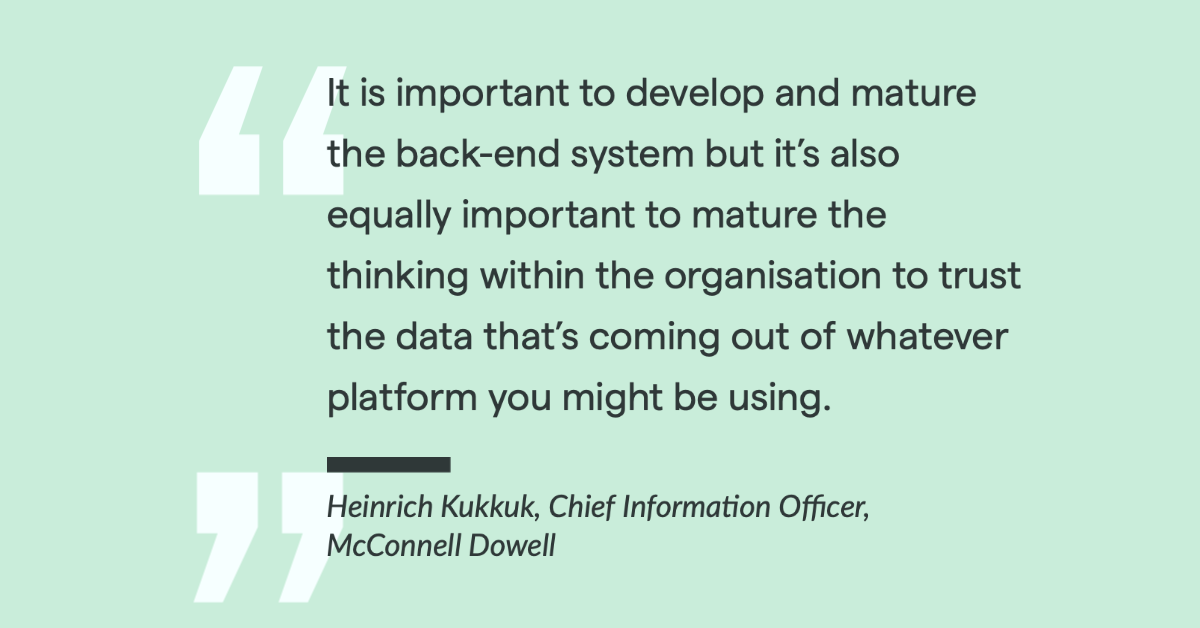
It's about establishing their trust in the data and the also the processes that support that.
But then also very closely lining that up to our management system so that it actually supports an operating rhythm and that it becomes the norm rather than you happen to use something new for that specific task.
One thing we've done that I think works really well with some of those larger transformational pieces is we haven't called them IT projects, they are business-led transformations that happen to have an IT system somewhere.
Heinrich Kukkuk, McConnell Dowell
“The other thing we've done is we've brought people in from our operational parts of the organisation into IT, like the building business, the rail business, the infrastructure business. So we really have a more in-depth understanding about how those businesses operate on a day to day basis.”
Bastian Uber, John Holland Group
“What's happening now is IT is becoming the fabric of our business. It's becoming of how we operate, so paper is no longer being used.
Our role is to support and align the solution of a process and map the data.
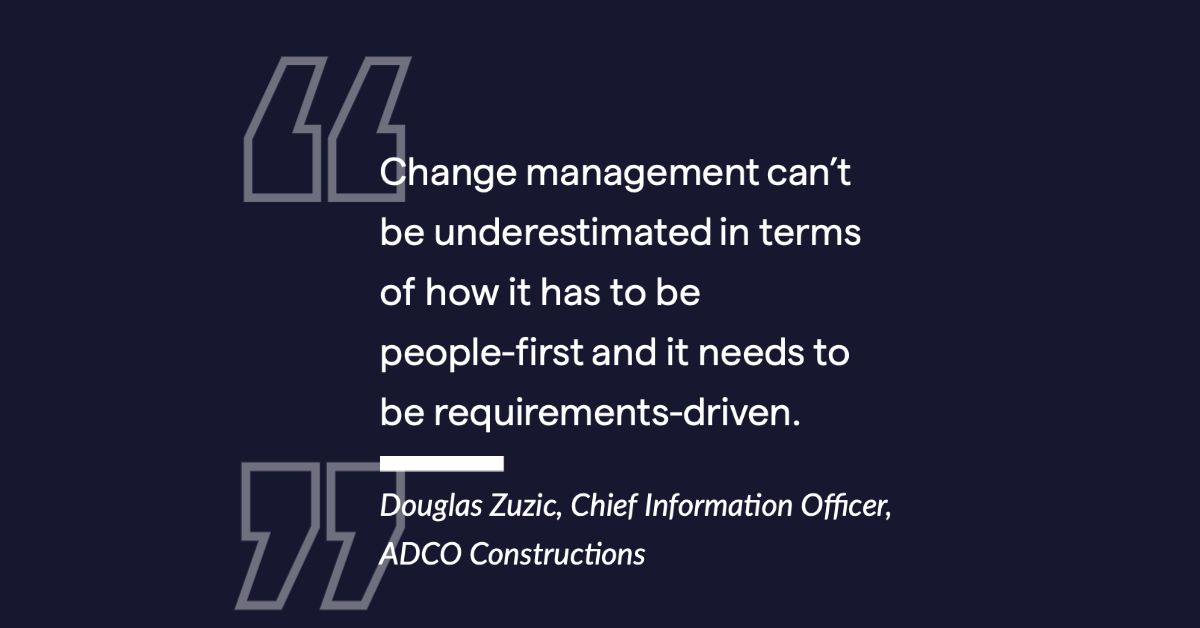
Watch out for IT fatigue:
“You can't just send an email out and say this is coming on Monday, those days are gone.”
Douglas Zuzic, ADCO Constructions
Standardisation and collaboration
“With construction on any project, you've got a lot of subcontractors, you've got project managers, you've got consultants, you've got engineers…There are so many different people that are working on the same process with a shared outcome.
It's gotta be not just an ADCO constructions, but it's a partnership model on how we can do it effectively, rather than using different systems, different processes and different sets of data.”
Douglas Zuzic, ADCO Constructions
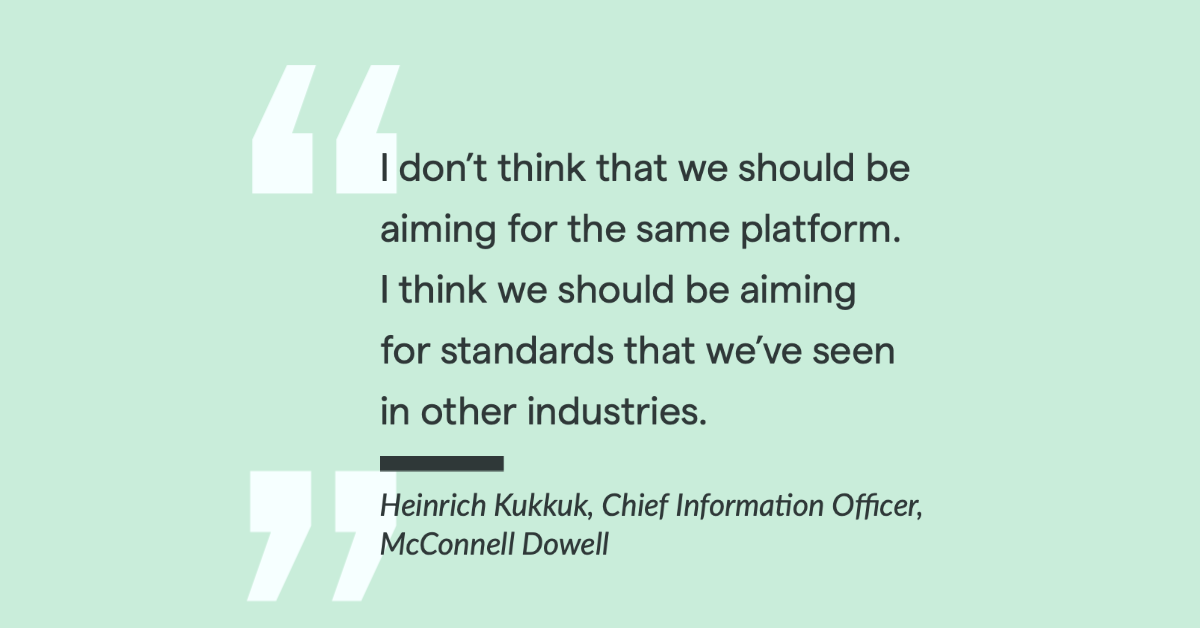 "For example, manufacturing had EDR standards 15-20 years ago. We probably want to get closer to that because as we've seen, when somebody has a monopoly on a product, typically that makes them slow and not quite as innovative.”
"For example, manufacturing had EDR standards 15-20 years ago. We probably want to get closer to that because as we've seen, when somebody has a monopoly on a product, typically that makes them slow and not quite as innovative.”
Heinrich Kukkuk, McConnell Dowell
Talent attraction and retention
“Whilst we're moving away from in-house built systems, I'm not consuming the same amount of .net development out of that team and Delphi coding. But what we're doing is repurposing and re-skilling people to learn more about low code digital solutions or data, so I think that's really exciting for them because they learn new skills.
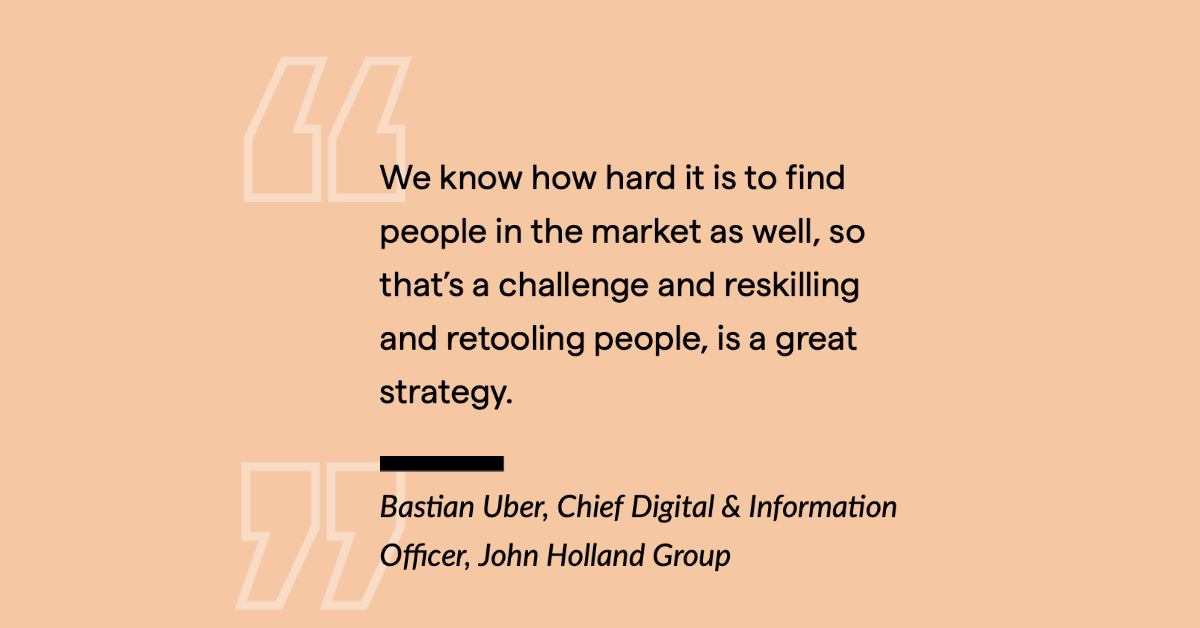
We've outsourced the support of those in-house built systems as well so that people don't feel they're working on legacy systems that are dinosaurs and they won't have a job in two or three years.
It allows them to again relearn new systems coming in and feel that “OK, I'm part of a longer-term vision here and I can learn new technologies.”
Bastian Uber, John Holland Group
“Tech or people in tech are different, some of the HR policies that we have in a construction company are not going to fit everyone. Not everyone is attracted to a company that just pays well. Our millennials now are asking: “What's your culture like? What are the benefits like?”
The other thing we're doing is, to date there's been a lot of legacy systems and you know in construction they say “if it ain't broke don't fix it.” But as we're moving to the cloud, these things don't actually work in the cloud, so it's illustrating the fact that we need to be more dynamic.
Don't wait for it to actually break. Be progressive and put those policies and procedures in place before the break happens and you’ll be able to get there with a more excited team.”
Lidia Ribarovska, Multiplex
Case studies
Snippets of stories shared by the tech leaders about their organisations’ journeys.
Lendlease
“We all know that there's huge inefficiencies in the way that data flows through organisations these days. So we decided to unpick the project management processes that underpinned our projects and to really shine a light on them and to look at how we can use technologies to create a single custody chain of data.
We can make our construction processes a lot more efficient if we have decisions made by the right people at the right time based on the right data.
So we created a project management platform and we looked at every aspect of decision making throughout project life cycle and we are trying to digitise every one of those, eliminating PowerPoints and spreadsheets and making sure that the information flows to the right person at the right time.”
John Holland
“If I look at John Holland digital transformation agenda, it's really broken into four core pillars.
The first pillar is really centered around our enterprise systems and over the next few years changing all of our enterprise systems and moving away from in-house built platforms to commercial off-the-shelf products.
The next component is around data and insights.
The next one is around emerging technology (drones and digital twin robotics, artificial intelligence, augmented reality, 5G).
Lastly, what I just called digitalisation, which is how do we get rid of all the paperwork we shuffle around in our industry and drive efficiencies by removing that paperwork and importantly capturing that data that would sit on that paper in someone’s desk drawer for a long period of time and harness that data.”
ADCO constructions
“For us at ADCO constructions, we've never had as many proof of concepts as in our business as what we do today, so there's a lot of trials happening across 56 projects across Australia and then we use the feedback from those trials to evaluate whether we're going to roll it across the business.
These digital initiatives only come through to fruition once you've actually got it across all projects, because that's when you can consolidate the data and that's when you could start to pick up on trends around AI and pieces like that.”
Downer
“Our business intelligence team are totally integrated in with the project teams, and we have another term which we call “project startup” and that's where you get your scope of works, your contracts aligned and your procurement up and running, etc.
Part of “project startup” now with project configuration is setting up all of the systems, it's getting everything configured, getting all of your metadata sorted out.
It's a new part of construction and it's really exciting place to be because we've got the ability now to align all of these construction systems (planning systems, forecasting system to your finance systems, commercial systems, HSE). All of these systems you can now align all of these just by the way you apply metadata, and you configure them.
It's a great part and it's bringing new types of talent into our construction teams that we've never had.”
Conclusion
Concluding remarks from the panel moderator are very fitting:
“In summary, there's a lot of change happening already that you're all very aware of what your organisations need, and probably one of the most exciting things we think about the drivers for change are that you're all talking about it from a people perspective, and so it's no longer IT or technology that needs to be there.
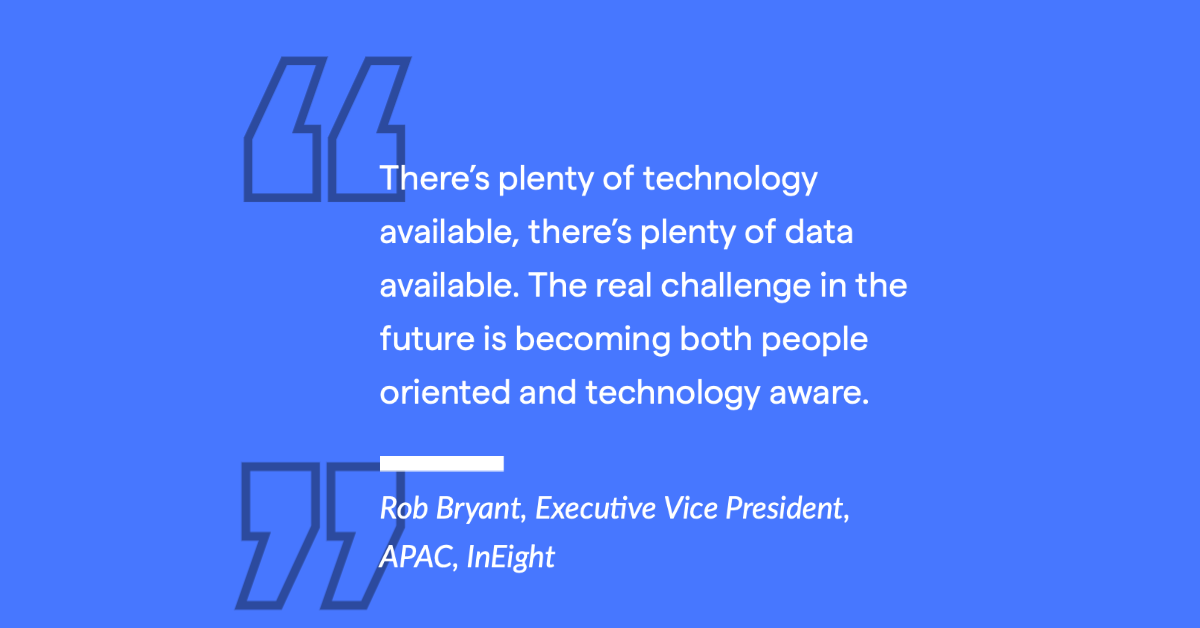
And that's a challenge for leadership, but it's one that sounds like you're all well and truly across, so that's encouraging.”
*The transcript has been edited lightly for clarity.
Recent Articles
Buy vs build procurement software: Six key factors to consider before you decide
When it comes to procurement solutions, we are finding today that some organisations are at a crossroads: should they build a custom solution in-house or buy a ready-made platform that’s already proven in market? This decision matters most in a world where supply chains are complex, compliance demands are rising, and inefficient manual processes are no longer competitive.
Supplier Relationship Management: Top 10 Do's and Don'ts.
Supplier relationship management (SRM) is the backbone of a resilient supply chain. When procurement teams manage suppliers effectively, they reduce risk, improve performance, and streamline delivery across large project environments. Whether you are modernising your vendor management system or replacing manual spreadsheets, these essential do's and don'ts will help you strengthen your SRM strategy.
2025 in review: Milestones, insights and achievements
2025 – a year of that brought meaningful developments for Felix as we continue to address the evolving needs of organisations navigating complex supply-chain environments.
Let's stay in touch
Get the monthly dose of supply chain, procurement and technology insights with the Felix newsletter.
